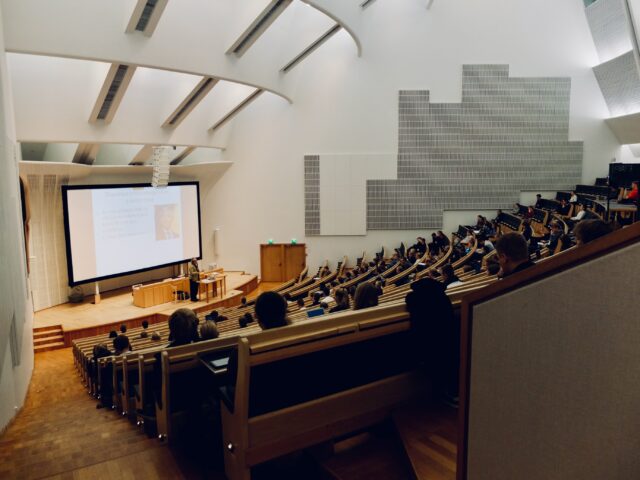Postsecondary institutions across the country are holding commemorative ceremonies to honour Indigenous Veterans Day and Remembrance Day. Several institutions also launched special events and shared resources to educate the community: Brock University held beaded poppy-making workshops; Camosun College, Centennial College, and Mount Allison University shared reading lists and learning resources; and Dalhousie University, MtA and the University of Saskatchewan published the stories of alumni, faculty, staff, and students who have served in the military. Two universities also celebrated the 100th anniversary of dedicated memorials: the University of Guelph’s War Memorial Hall and the University of Toronto’s Soldiers’ Tower.

Top Ten News
November 11, 2024
The University of New Brunswick and the 5th Canadian Division Support Base Gagetown have signed a Memorandum of Understanding (MOU) to foster collaboration and exchange. The MOU will provide active-duty, transitioning, and retired military personnel with expanded access to postsecondary education at UNB and improve credit recognition for military training and non-formal learning. Additionally, UNB and the base have established a strategic partnership to enable UNB students, faculty, and staff to engage in collaborative projects with the base, while offering military members access to university research and professional development.
The Government of Ontario has announced several efforts to improve educational opportunities for Canadian Armed Forces (CAF) members and veterans. Proposed changes under the Honouring Veterans Act would, if passed, create more pathways to careers in the trades for CAF members and veterans. These changes include allowing individuals with certain military trades credentials to take the qualifying exams for the equivalent civilian trades credentials and enhancing postsecondary Prior Learning Assessment and Recognition processes to better recognize CAF training and work experience. The province is also investing $2.4M into free technology and cybersecurity training for veterans.
The Government of Manitoba has revised the education requirements for early and middle-year teachers. Effective immediately, new teachers are no longer required to specialize in an approved list of major or minor subject areas, nor are they required to complete set credit hours in math, science, or languages. MB Acting Education Minister Tracy Schmidt said that the changes will align Manitoba with standards in other Canadian provinces and address teacher shortages. While the Manitoba Teachers’ Society and some university professors have openly expressed their support for the revisions, other academic representatives and political groups have voiced their concerns about the change’s potential impacts on the quality of K-12 education.
The Government of Canada is investing $79.1M to support Ericsson Group’s $634.8M project to advance 5G technologies and boost research and development (R&D) in the telecommunications industry. Through this expanded partnership agreement, Ericsson says that it will welcome more than 600 co-op students through its university partnerships and commit to more than 10 academic collaborations a year, in addition to creating more than 190 high-skilled jobs. The project will focus on R&D work for cloud-based wireless technologies and architectures, as well as AI and quantum computing solutions. “By enhancing our R&D efforts in Ottawa and Montréal, we aim to stimulate Canada’s 5G ecosystem and contribute to the prosperity of the entire tech sector,” said Ericsson President Börje Ekholm.
The University of Guelph has received $1.45M over 30 months from the Government of Canada’s Oceans Protection Plan to study the impact of bitumen exposure on Pacific salmon returning to freshwater systems to spawn. The purpose of the project is to understand the effects of oil spills on salmon and improve post-spill assessment methods. UoGuelph will collaborate with researchers at Simon Fraser University as well as local Indigenous communities, who have a connection to and knowledge of Pacific salmon and the watershed. “Pacific salmon are an important resource that needs to be protected,” said UoGuelph Professor Dr Todd Gillis. “Expanding our knowledge on these effects will help safeguard salmon populations and the communities that rely on them.”
The University of Winnipeg Foundation recently launched the Venture Fund Group, a “Dragon’s Den”-style opportunity that allows graduate students and faculty members to pitch their innovative projects and ideas to a group of investors. Each investor may pledge up to $5K, which the foundation will match dollar for dollar. “The idea behind this new initiative we’ve called the Venture Fund Group, was designed to connect a younger generation of donors with researchers working to solve key scientific and social challenges,” said University of Winnipeg Foundation President Javier Schwersensky. “The strength of this group comes from both the generosity of its members, and the freedom they have as investors to choose where they believe their funding will have the greatest positive impact.”
Algonquin College and McGill University have shared updates on how they are contending with provincial and federal government policy changes around out-of-province and international students. Algonquin President Claude Brulé said that the federal cap on international students is “creating unprecedented financial challenges,” with a projected revenue decrease of $32M over multiple years. The college has implemented a variety of mitigation measures, including deferring expenses, reducing corporate expenditures, and reviewing hiring and staffing decisions. McGill has announced that it has stabilized its enrolment by admitting more QC students and using a new scholarship—the Canada Award—to offset tuition hikes for out-of-province students. However, McGill plans to scale back this scholarship program to ensure that it is sustainable in the future.
Universities Canada has relaunched the UniversityStudy.ca platform to help prospective students make informed decisions about their future university studies. The bilingual platform now includes a new scholarships database and an in-depth resource centre that covers topics such as residence options and graduation preparation. “We’re thrilled to offer an expanded UniversityStudy.ca platform that goes beyond program listings to include tools that simplify the search for financial support and other resources vital to student success,” said Universities Canada President Gabriel Miller.
Immigrations, Refugees, and Citizenship Canada is no longer accepting study permit applications under the Student Direct Stream or the Nigeria Student Express initiatives, effective November 8th. CIC News reports that the Student Direct Stream was launched in 2018 to expedite the study permit application process for international students from 14 countries. It reportedly had historically higher approval rates and faster processing times compared to the standard process. Eligible applications that were received before the cut off time on Friday will be processed under those streams; all other study permits will be processed under the regular study permit stream.
